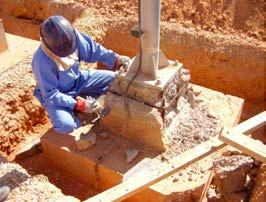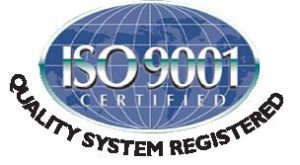Migrating Corrosion Inhibitor (MCI)
What is MCI® Technology?
Cortec® Corporation’s patented MCI® (Migrating Corrosion Inhibitor™) Technology protects reinforcing metal in concrete from corrosion. Often, corroding rebar in deteriorating concrete is the cause of costly repairs, financial losses, injuries, and even deaths, but Cortec® has the corrosion solution.
MCI® greatly extends the service life of new and existing structures by proactively delaying the onset of corrosion and keeping rates low after initiation. Cortec® MCI® products maintain structural integrity, rehabilitate vulnerable structures, and alleviate environmental concerns.
How Does MCI® Technology Work?
MCIs are based on amine technology (amine alcohols and amine carboxylates). They are classified as mixed inhibitors, meaning they affect both anodic and cathodic portions of a corrosion cell.
MCI® is applied in many forms including as a concrete admixture or a topical treatment. It moves as a liquid through the concrete matrix via capillary action and migrates in a vapor phase throughout the concrete pore structure.
When MCI® comes in contact with embedded metals, it has an ionic attraction to it and forms a protective molecular layer. This film prevents corrosive elements from further reacting with the reinforcement and also reduces existing corrosion rates, greatly extending concrete service life.
Concrete Structures
Migrating Corrosion Inhibitor (MCl®) technology, developed by Cortec's researchers, rehabilitates deteriorated concrete structures affected by corrosion on reinforcing steel. MCI® products can be added to concrete mixtures for new structures or during rehabilitation of old buildings. Concrete, mixed with MCI® products is poured and finished in the normal fashion. MCI® migrates through the concrete and seeks the embedded metal, attaching to it and forming a protective layer of MCls. The MCI® layer will mitigate the chemical reaction between chlorides and metal within the structure to prevent corrosion. MCI® products are effective in fighting high chloride levels from de-icing salts applied to highways and bridges, airborne salts that attack marine structures, structures near sea water, and deterioration by acid rain and carbonation. MCI® technology also provides corrosion protection for tanks and pipes with thermal insulation. In addition to adding MCI® into your concrete mix, Cortec® offers MCI® products for surface treatments or injection into existing concrete structures.
Watch this excellent video demonstrating how MCI® Technology works.
Content courtesy of Cortec Corporation, St. Paul, MN.
Post-Tensioning
Post-Tensioning (PT) presents unique corrosion problems for concrete structures such as bridges and overpasses. Cortec® provides excellent corrosion solutions for these applications. MCI®-309 Powder can be applied in void spaces in the precast concrete to protect pre-stressed cables before grouting. MCI®-309 does not have to be removed prior to grouting, therefore eliminating extra steps. MCI® admixtures can be added to grouts to protect sensitive PT tendons, and PTC Emitters can be used to protect bridge suspension cables.

PTC Emitters were developed to help arrest corrosion on the suspension cables of the Severn Bridge between England and Wales.
Repair
 MCI® is important for ensuring the longest possible lifespan of concrete restoration projects. MCI® not only slows the rate of corrosion begun in deteriorating structures, but also protects against the troublesome ring anode/insipient anode effect that often follows concrete repairs. MCI® is ideal and convenient to add to concrete repair mixtures and migrates through adjacent areas after application to protect embedded reinforcement. MCI® is also available as a passivating grout for use on exposed rebar, or as a topical treatment to existing surfaces.
MCI® is important for ensuring the longest possible lifespan of concrete restoration projects. MCI® not only slows the rate of corrosion begun in deteriorating structures, but also protects against the troublesome ring anode/insipient anode effect that often follows concrete repairs. MCI® is ideal and convenient to add to concrete repair mixtures and migrates through adjacent areas after application to protect embedded reinforcement. MCI® is also available as a passivating grout for use on exposed rebar, or as a topical treatment to existing surfaces.
Surface Treatment: Pure Inhibitors
 MCI® can be applied to existing structures as a surface treatment that reduces corrosion rates. This surface treatment is designed to penetrate into and migrate through cementitious materials to reach and protect embedded reinforcing metal. MCI® surface treatments can be applied on vertical and overhead surfaces, as well as horizontal surfaces. MCI® pure inhibitors do not contain water repellants but provide extra-strength corrosion protection to embedded rebar through a powerful dose of MCI® inhibitors. These straight inhibitors work at rebar level to effectively protect reinforcing metal from corrosive elements with or without the use of sealers.
MCI® can be applied to existing structures as a surface treatment that reduces corrosion rates. This surface treatment is designed to penetrate into and migrate through cementitious materials to reach and protect embedded reinforcing metal. MCI® surface treatments can be applied on vertical and overhead surfaces, as well as horizontal surfaces. MCI® pure inhibitors do not contain water repellants but provide extra-strength corrosion protection to embedded rebar through a powerful dose of MCI® inhibitors. These straight inhibitors work at rebar level to effectively protect reinforcing metal from corrosive elements with or without the use of sealers.
Surface Treatment: Water Repellant MCI®
MCI® sealers combine water repellency with the added protection of Migrating Corrosion Inhibitors. These MCI® surface treatments seal surface pores to block carbonation and protect against the ingress of water, chlorides, and other aggressive contaminants. Below the surface, MCI® penetrates to the depth of embedded metallic reinforcement to form a protective monomolecular layer on the surface of the rebar. This protective layer delays the onset of corrosion and reduces corrosion rates after initiation, greatly extending the service life of structures.
Several MCI® materials have been tested according to U.S. Bureau of Reclamation M-82 Protocol. The MCI® materials were applied after 10,000 Coulombs of corrosion was reached in test slabs. This is the criteria used if the performance of the surface applied repair does not depend upon the amount of chloride present at the reinforcing bars, or if protection at a higher initial chloride content level is to be demonstrated. All materials tested were found to significantly reduce corrosion and cracking at a high level of chloride exposure.
Watch this excellent video demonstrating how MCI® Technology works.
Content courtesy of Cortec Corporation, St. Paul, MN.



